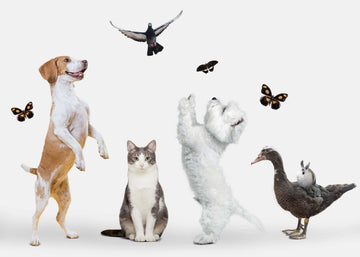Nourishing Companions: A Guide to Pets and Their Nutrition

Introduction:
Pets hold a special place in our hearts. They're not just animals; they are beloved members of our families. Providing them with proper care, including a nutritious diet, is essential for their health, happiness, and longevity. In this blog, we'll explore the importance of selecting the right food for our furry, feathery, or scaly friends, ensuring them to lead vibrant and fulfilling lives.
1. Understanding Pet Nutrition:
Dietary Requirements: Just like humans, pets require a balanced diet. Dogs, cats, birds, and reptiles all have different nutritional needs. Understanding these requirements is the first step in choosing the right food.
Essential Nutrients: Proteins, carbohydrates, fats, vitamins, and minerals are vital for your pet's overall health. High-quality pet foods are formulated to provide these nutrients in the right proportions.
2.Types of Pet Food:
Dry Food: Dry kibble is convenient and has a longer shelf life. It's also beneficial for dental health, as the crunchiness helps remove plaque.
Canned Food: Canned pet food often contains more moisture, making it an excellent choice for pets who don't drink enough water. It's highly palatable and can be a good option for pets with dental issues.
Raw and Homemade Diets: Some pet owners opt for raw or homemade diets. While these can work well with proper planning, they require extensive research to ensure they meet all nutritional requirements.
3. Specialized Diets:
Life Stage Diets: Pets have different dietary needs at various life stages. There are specific foods for puppies and kittens, adult pets, and seniors, ensuring they get the right nutrients at every age.
Medical Diets: Pets with certain health conditions, such as allergies, kidney disease, or obesity, may require specialized diets. These are formulated to support their specific health needs.
4. Importance of Portion Control:
Obesity Prevention: Overfeeding can lead to obesity in pets, which can cause various health problems. Following the recommended portion sizes on the pet food packaging is crucial.
Regular Exercise: Alongside a balanced diet, regular exercise is vital for maintaining a healthy weight. Interactive playtime and daily walks for dogs are excellent ways to keep them active.
5. Treats and Snacks:
Moderation is Key: While treats and snacks can be great for training and bonding, they should be given in moderation. Look for healthy treats made from natural ingredients to avoid unnecessary additives.
Homemade Treats: Making treats at home allows you to control the ingredients. There are many pet-friendly recipes available online, from dog biscuits to birdseed treats.
Conclusion:
Choosing the right food for your pet is a demonstration of love and care. By understanding your pet's nutritional needs, selecting appropriate food, and ensuring proper portion control, you contribute significantly to their well-being. A healthy diet not only impacts their physical health but also enhances their energy levels and overall happiness. Remember, a well-fed pet is a happy pet, and a happy pet makes for a joyful and fulfilling companion in your life.




